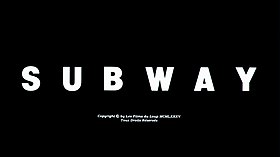Subway (film)
| Movie | |
|---|---|
| German title | Subway |
| Original title | Subway |
| Country of production | France |
| original language | French |
| Publishing year | 1985 |
| length | 98 minutes |
| Age rating | FSK 12 |
| Rod | |
| Director | Luc Besson |
| script | Luc Besson Pierre Jolivet Alain Le Henry Marc Perrier Sophie Schmit |
| production | Luc Besson Louis Duchesne François Ruggieri |
| music |
Eric Serra Rickie Lee Jones |
| camera | Carlo Varini |
| cut | Sophie Schmit |
| occupation | |
| |
Subway is a French thriller from 1985. Directed by Luc Besson , who co- wrote the script with Pierre Jolivet , Alain Le Henry , Marc Perrier and Sophie Schmit . Isabelle Adjani and Christopher Lambert played the main roles . The film was a financial success in France.
action
Fred, an anarchist " punk ", is on the run. Followed by a heavy Mercedes, full of men in elegant tuxedos, Fred steers his Peugeot deeper and deeper into the center of Paris until he finally has no choice but to change the mode of transport. Driven into a corner, he barely manages to get to the Paris subway (Métro) . A journey into the underworld begins.
The reason for the increased interest in Fred quickly becomes clear. He is in possession of ominous documents that he illegally stole from a rich businessman's party by blowing up the safe there. The key to this fine company was the lady of the house herself. The beautiful Héléna had invited Fred, who was actually unknown but helpful. But to top it all off, and in a very unprofessional manner, Fred falls in love with Héléna, which not only stands in the way of a lucrative exploitation of the stolen documents through blackmail, but also puts Fred in additional danger, since Héléna is now used as a decoy.
But Fred is not alone. Trapped in the catacombs of the extensive Parisian subway system, he made the acquaintance of a heap of subversive, bizarre types of parallel society who have nested in the dark corridors and whose lives end in front of the night barriers of the subway stations. They earn their living by stealing handbags or selling flowers, much to the displeasure of the station policemen who ensure security, an illustrious troop of oversubscribed losers who are always on their heels, but always come a moment too late.
Soon, too, Héléna, tired of waiting on the platform, lost herself in the dark corridors of the Parisian underground and met Fred. Gun in hand, she tries to resolve the matter her own way and force Fred to hand over the papers. When she fails, her initial hostility turns into sympathy and understanding over the course of an intoxicating night in which she walks with Fred and his friends through the deserted subway systems. After that night, she breaks up with her husband, who is swimming in the money, and his hypocritical, boring and bourgeois friends and returns to the metro station to protect Fred from the killers hired by her husband.
Fred, who has now made money after a little robbery on a money courier, uses this to let his band, which was recruited from street musicians, perform live in the foyer of the subway hall. The moment his greatest dream comes true, it comes to a showdown. One of the killers has ambushed Fred in his sights, Héléna storms, happy about the hoped-for reunion, through the crowds towards Fred, while the band plays their first song and makes the audience rave. A shot. Fred slumps, Héléna bends over the man who is lying on the floor and answers his last question, whether she loves him at least a little, with a kiss.
backgrounds
Besson explicitly decided on an action in the Paris Metro , as this place, as he himself explained several times, has a strongly surreal character for him. In this film, he was less concerned with the specific locations - the station names of the metro can only be seen once in the film (“Pte. De Versailles”) - but rather with the special atmosphere of a closed world in which the most diverse types act. Galabru characterized his work in this film as follows: He felt as if he was on stage in a play and not in a film production.
Reviews
The film-dienst celebrated Besson's film in its contemporary criticism as "an aesthetically impressive version of" film noir "and an homage to the bowels of Paris, the metro, borne by noticeable sympathy for its people" . Subway is an "atmospheric modern décor cinema."
Awards
The film won the César Prize in three categories:
- Christopher Lambert as Best Actor ,
- Alexandre Trauner as Best Production Designer ,
- Best tone .
He was also nominated in the following categories:
- Best movie,
- Luc Besson for Best Director ,
- Isabelle Adjani for Best Actress ,
- Carlo Varini for the best camera work ,
- Sophie Schmit for the best cut ,
- Éric Serra for Best Score ,
- Michel Galabru , Jean-Pierre Bacri and Jean-Hugues Anglade as Best Supporting Actors .
The film was nominated for the BAFTA Award for Best Foreign Language Film . It was also nominated for Best Film for the Festival Internacional de Cinema do Porto .
Web links
- Subway in the Internet Movie Database (English)
- aboutfilm.com: Subway
- The New York Times: Subway
- kamera.co.uk: Subway (engl.)
Individual evidence
- ^ Subway. In: Lexicon of International Films . Film service , accessed March 2, 2017 .
